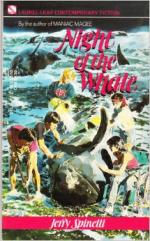|
This section contains 288 words (approx. 1 page at 300 words per page) |

|
Night of the Whale does treat some very important issues. Central to it is humankind's responsibility to nature.
The episodes dealing with the stranded whales are exciting. They are handled realistically: Spinelli does not underplay the suffering of the whales, and he definitely shows that trying to rescue them is a largely futile activity.
Still, most of the characters in the book, including Mouse, the narrator, are convinced that it is one's duty to try to rescue them anyway. Hacksaw represents the opposing point of view, although he is not treated sympathetically, and he never speaks for himself.
Nonetheless, the book does present some problems. Its central humor is scatological, and its ideas about maturity are open to serious questions.
Mouse's idea that maturity can be measured in terms of things like chugging beer and mooning someone is never refuted or even questioned in the course...
|
This section contains 288 words (approx. 1 page at 300 words per page) |

|




